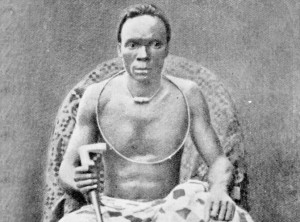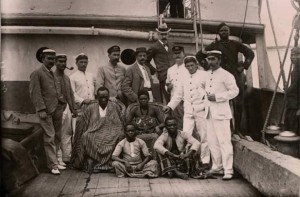
Nana Olomu, born 1852 in Jakpa, was the Itsekiri chief and merchant in Palm Oil who occupied the position of the comey collector, essentially the chief tax officer, hence, Governor of the Benin River area between 1886 and 1894, the fourth Itsekiri to so occupy the position. Nana was during this revolutionary phase of Benin River area politics the head of the Itsekiri, performing all functions of the Olu, or king, except the spiritual, which remained the exclusive preserve of the Olotu, or regent of the suspended Olu title. The capture of Nana by the British in 1894 signaled an end to the governorship system of the area and the overthrow of all native powers by the colonial with Warrant chiefs whose authority is derived solely from colonial powers serving as the link between British imperial power and the local people.
Governor, Benin Rivers
Nana became Governor of the Benin Rivers area when his predecessor, Chanomi who was an old foe of his father’s refused the staff of office which was returned to him after it had been taken away by the British following reports of his misrule. Nana was the son of Olomu who was the maternal nephew to Olu Akengbuwa- the last Olu before the interregnum of 88 years that sprang up the primacy of the governor’s office. Feud between Olomu who was Nana’s father, and Governor Chinomi inspired Chinamoni’s family to promote the most promising of their own into becoming a formidable opponent to Olomu’s family.
Trading Empire
Nana’s own trading empire extended primarily into the hinterlands of the Benin and Ethiope Rivers. His monopolistic control of trade in the Benin River stifled Urhobo traders and Europeans who now have their share of the trade significantly reduced. Nana signed a treaty on behalf of his people in 1884 that gave the British rights over Itsekiri. By this treaty, Itsekiri became the first protectorate in the Western Niger Delta, few years before the successive fall of Ovonramwen’s Benin. Nana, delighted by the parts which assigned unto his land even greater trading advantages ignored the grey areas, or the part of the agreement which essentially put an end to the sovereignty of Itsekiri. Relationship between the parties was at the beginning, smooth. Times, to his oblivion, did change and the treaty which he supposed was specially his’ would be extended to Urhobo communities within the sphere of his commercial influence. Great Britain’s empire builder, Goldie Taubman had plans that encompasses the Urhobo, and ultimately the entire southern Nigeria. When Nana realized this, he resulted into confrontational acts which conflicted with the terms of the 1884 treaty.
Fall of Olomu

In 1894, Nana attacked Urhobo villages that had abandoned the norm to trade directly with the British. Protest trade boycott by the Urhobo was easily noticed by the British who swiftly intimidated Itsekiri chiefs into a new treaty that reflected the tone with which the now imperialistic Britain, coming from the “moral” authority obtained at the Berlin Conference of previous years had addressed other groups in the Western Niger Delta. By the end of that year, tensions had reached a head and the British stormed Nana’a fortress at Ebrohimi, arresting and exiling him to Accra, Ghana with a stipend to cater for his needs while his business is taken away. A plea was made on his behalf to London, albeit unsuccessfully, by leaders of the Aborigine Protection Society in Ghana to restore his business. Nana Olomu died in 1916, ten years after returning from exile to set his feet on his Itsekiri homeland again, a fate his like in Opobo, JaJa never enjoyed.





















